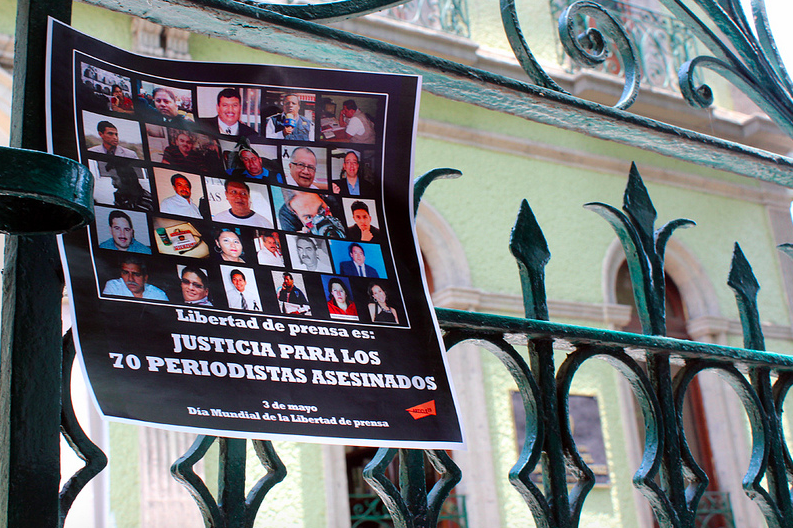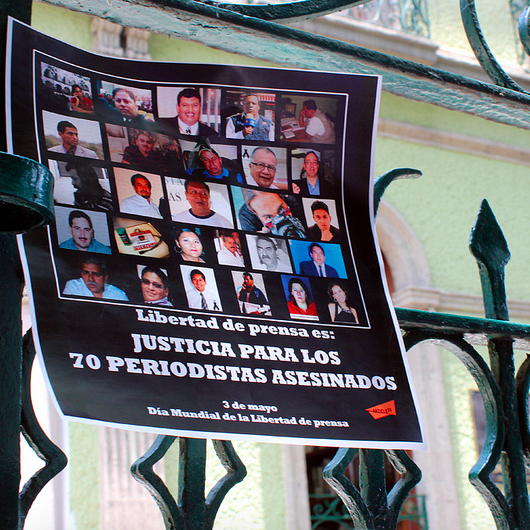
Photo via Flickr
Mexico is not the best place to be a journalist. Granted, there’s no bloodthirsty dictatorship at the helm, but that hasn’t prevented it ending up in 148th place- out of 180- on the 2015 World Press Freedom Index produced by Reporters Without Borders. Despite the absence of armed conflict, it is nevertheless one of the most dangerous places in the world to work in the media: in 2014, Mexico recorded the highest number of deaths among those in the journalism sector out of all the countries in America (3 reporters and one blogger). Since 2000, around 90 journalists have died there.
There have been attacks, kidnappings, assaults and destruction of property. The most serious threat to Mexican journalism arises from the black hole of illegality and conspiracies: the relationships between organised crime, the government and politicians are an insurmountable obstacle, made even more challenging by the country’s law enforcement and legal systems blocking the way still further.
According to the Comisión Nacional de los Derechos Humanos (National Human Rights Commission), 89% of crimes against journalists remain unpunished, in a context where police and magistrate enquiries often get bogged down and are lost in the mire of prehistoric bureaucratic procedures. According to data collected by the Committee to Protect Journalists, the impunity index for acts perpetrated against media operators puts Mexico in 7th place worldwide, a dubious record topped only by Iraq, Somalia, Philippines, Sri Lanka, Syria and Afghanistan.
The risk is that this dangerous lack of protection and effectiveness will in some way “authorise” attacks on press freedom, placing journalists “at greater risk”, according to Dario Ramirez, president of Article 19, an international organisation which works to safeguard press freedom by monitoring and documenting threats and attacks on journalistic work.
Little wonder, then, that many reporters are forced to flee their own country. Over a dozen journalists have been forced to flee abroad to the USA, Canada and Europe. They were “all threatened in different ways and for different reasons,” explains Balbina Flores Martìnez, Mexican correspondent for Reporters Without Borders and herself a victim of intimidation, “some for information they made public, or for things they were investigating.”
Anabel Hernandez, for example, vowed to herself never to leave her country, in spite of the severe intimidation to which she was subjected. One of the best-known investigative journalists in Mexico, Hernandez wrote numerous reports on drug-trafficking and abuses of power for Reporte Indigo, Proceso, La Reforma and El Universal. Because of this work, she was obliged to live for years under 24-hour surveillance. It was she who uncovered the “Toallagate” (Towelgate) affair, as it become known when it hit the headlines, the 2001 inquiry into then President Fox’s improper use of money which led to a major political scandal, and for which the writer received numerous international honours.
“The underlying issue in Mexico is that the vast majority of media outlets live off government advertising dollars, not the papers they sell every day on the streets.” Anabel Hernandez explained to Cosmopolitan. “The result is that many outlets are more loyal to the government than to their audiences.” Indeed, the influence of politics on journalism is another of the sticking-points compromising press freedom in Mexico.
Marta Duran knows this only too well. This journalist, who also teaches journalism at the Universidad del Claustro de Sor Juana in Mexico and political journalism at the Carlos Septién García School of Journalism, is a sociology expert who has worked for the Proceso, Excelsior and La Jornada newspapers. She has an in-depth knowledge of the problems of contemporary Mexico and discusses them in all of her publications: she has eight books to her name, including “Io, Marcos”, published in Italian by Feltrinelli.
She and Anabel Hernandez will be speakers at the panel discussion entitled Not only Ayotzinapa: dissent, repression and freedom of the press in Mexico at the International Journalism Festival, together with Rai Radio journalist Cecilia Rinaldini and Ivan Baez, head of the Protection Programme for the Mexican and Central American branch of Article 19. Baez is a law graduate and rapporteur for a variety of national and international platforms. He has been advisor to the National Supreme Court of Justice and the Human Rights Commission for the City of Mexico and has written extensively on human rights and worker protection.
Saturday 18th April from 17.00 to 18.30, in the Sala del Dottorato.


